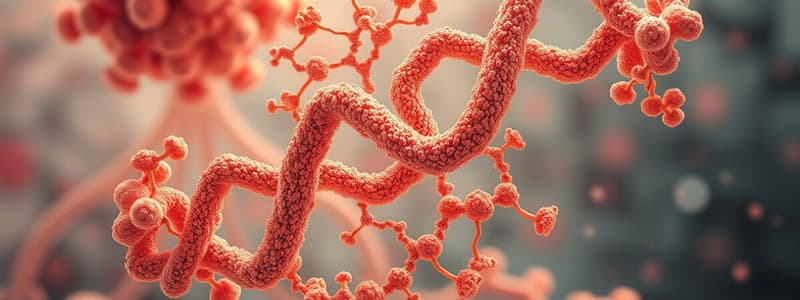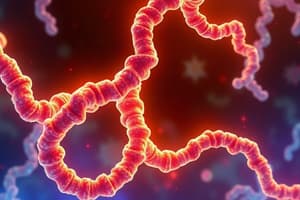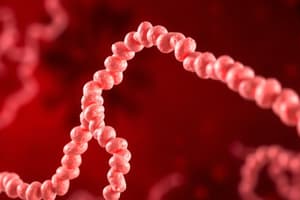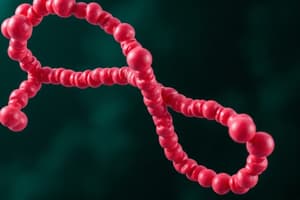Podcast
Questions and Answers
What role do antibodies play in relation to pathogens?
What role do antibodies play in relation to pathogens?
- They break down pathogens directly.
- They facilitate phagocytes' ability to engulf pathogens. (correct)
- They inhibit the production of lymphocytes.
- They replicate pathogens for identification.
Which statement accurately describes monoclonal antibodies?
Which statement accurately describes monoclonal antibodies?
- They are specific to a unique antigenic sequence. (correct)
- They have a broad range of binding sites for various antigens.
- They can be produced from multiple animal sources.
- They only neutralize bacterial toxins.
What is the major difference between monoclonal and polyclonal antibodies?
What is the major difference between monoclonal and polyclonal antibodies?
- Polyclonal antibodies have a specific binding site for one antigen type.
- Polyclonal antibodies can recognize diverse variations of an antigen, while monoclonal antibodies cannot. (correct)
- Monoclonal antibodies are exclusively used for cancer treatment.
- Monoclonal antibodies are produced by hybridomas, while polyclonal antibodies come from two or more species.
How are monoclonal antibodies mass-produced?
How are monoclonal antibodies mass-produced?
What is a common application of monoclonal antibodies in medical diagnosis?
What is a common application of monoclonal antibodies in medical diagnosis?
What happens to spleen cells after they are removed from the animal during monoclonal antibody production?
What happens to spleen cells after they are removed from the animal during monoclonal antibody production?
In cancer treatment, how do monoclonal antibodies function?
In cancer treatment, how do monoclonal antibodies function?
What is an incorrect statement regarding the production of monoclonal antibodies?
What is an incorrect statement regarding the production of monoclonal antibodies?
Why are enzymes relevant to the action of antibodies?
Why are enzymes relevant to the action of antibodies?
What is the significance of the variable region in an antibody?
What is the significance of the variable region in an antibody?
Which of the following statements about antibody structure is correct?
Which of the following statements about antibody structure is correct?
What role do hinge regions play in antibody function?
What role do hinge regions play in antibody function?
How do antibodies neutralize pathogens?
How do antibodies neutralize pathogens?
In what way do antibodies promote agglutination?
In what way do antibodies promote agglutination?
What component of an antibody remains unchanged across different antibody molecules?
What component of an antibody remains unchanged across different antibody molecules?
Which aspect of an antibody's structure is critical for its specificity to a particular antigen?
Which aspect of an antibody's structure is critical for its specificity to a particular antigen?
What is the primary function of antibodies that bind to viral attachment proteins?
What is the primary function of antibodies that bind to viral attachment proteins?
Why are antibodies classified as glycoproteins?
Why are antibodies classified as glycoproteins?
Which feature of antibodies helps them to bind efficiently to phagocytes?
Which feature of antibodies helps them to bind efficiently to phagocytes?
Flashcards are hidden until you start studying
Study Notes
Overview of Antibodies
- Antibodies are glycoproteins specialized for recognizing specific antigens.
- Their unique structure defines their function and specificity.
- Antibodies are complementary in shape to their specific antigens.
Antibody Structure
- Antibodies have a Y-shaped structure consisting of four polypeptide chains: two heavy chains and two light chains.
- A constant region is present in every antibody, facilitating binding to phagocytes.
- The variable region, unique to each antibody, serves as the antigen binding site, akin to an enzyme's active site.
- Flexible hinge regions allow the Y-shaped branches to move apart, enhancing the ability to bind to multiple antigens.
Antibody Functions
Neutralisation
- Antibodies neutralize toxins produced by pathogens by binding to and inactivating them.
- They can block viral infections by binding to viral attachment proteins, preventing viruses from infecting cells.
Agglutination
- Antibodies can clump multiple pathogens together, making infections less likely and facilitating easier engulfment by phagocytes.
Marking
- Antibodies tagged to pathogens signal phagocytes and lymphocytes, directing immune response toward the pathogens.
Lysis
- Enzymes can bind to antibodies linked to pathogens, catalyzing reactions that dismantle bacteria bound to these antibodies.
Monoclonal and Polyclonal Antibodies
- Monoclonal antibodies target specific antigenic sequences with high specificity.
- Polyclonal antibodies recognize diverse variations of a particular antigen, allowing recognition of mutants or species differences.
Functions of Monoclonal Antibodies
- Used in poisoning treatment, neutralizing various toxins in patients.
- Employed in cancer therapies targeting tumor-specific antigens to destroy cancer cells and recruit immune cells.
- Utilized in medical diagnostics, such as pregnancy tests detecting human chorionic gonadotrophin (hCG) in urine samples.
Producing Monoclonal Antibodies
- The hybridoma method is used for mass production of monoclonal antibodies:
- Mice are injected with an antigen to stimulate an immune response, producing antibodies.
- Spleen cells, responsible for lymphocyte production, are extracted from the mouse.
- These spleen cells are fused with myeloma cells, creating hybridoma cells capable of indefinite division and monoclonal antibody production.
- Hybridoma cells are cultured in the lab for antibody production.
- The resulting monoclonal antibodies are harvested for further applications.
Studying That Suits You
Use AI to generate personalized quizzes and flashcards to suit your learning preferences.




